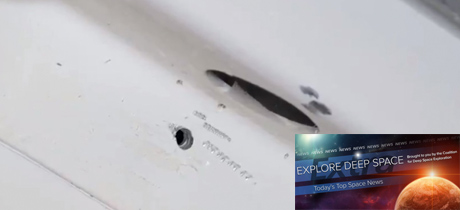In Today’s Deep Space Extra… International Space Station (ISS) commander Drew Feustel, of NASA, offered assurances on Tuesday, his crew was not responsible for a small hole discovered August 29-30 in one of two Soyuz crew transport capsules docked to the Station’s Russian segment. Exploration best explains the value of human spaceflight, according to noted space historian. Osiris-Rex eyes target sample return asteroid Bennu. NASA, NOAA offer compelling space views of mighty Hurricane Florence.
Human Space Flight
NASA astronaut: We didn’t drill hole that caused ISS pressure leak
Florida Today (9/11): In an interview with ABC News on Tuesday, International Space Station (ISS) commander Drew Feustel, a veteran NASA astronaut, said the orbiting science lab’s six member, U.S., Russian and European crew were not responsible for the small hole in the Station’s Russian segment that was detected by flight controllers in Houston and Moscow late August 29. The hole is blamed for a temporary pressure drop inside the Space Station. Within hours of its discovery, the Station’s crew had located and patched the hole. NASA said the flight crew was not in any danger. A Russian investigation into the incident and possible causes is to wrap up soon.
The costs of human spaceflight are high. History shows the benefits are too
Time (9/11): The value of human space flight has been debated for decades. The topic has re-emerged as NASA prepares to mark its 60th anniversary in early October. Historically, the highest value is human exploration, or expanding the domain in which human beings can live and work, writes John Logsdon, space historian and founder of the George Washington University Space Policy Institute.
Space Science
NASA’s asteroid-sampling spacecraft begins its science work today
Space.com (9/11): NASA’s Osiris Rex asteroid sample return mission, launched two years ago, began observing Bennu, its target, from afar for dust clouds on Tuesday. The findings will inform plans for Osiris Rex to rendezvous with Bennu on December 3 and maneuver into orbit on December 31. After a lengthy close up mapping session, mission scientists will select a site on the 1,600 foot long asteroid to land and gather a sample in July 2020. Currently, Osiris Rex is slated to depart Bennu in March 2021. The probe’s sample return capsule would descend to Earth on September 24, 2023.
NASA/Goddard (9/11): The Tropical Storm season is far from over, according to a flurry of activity underway in the Atlantic Ocean. Hurricane Florence, though has taken the point, as the large and powerful storm nears the U.S. mid-Atlantic, prompting widespread storm warnings and high level calls for evacuation. Images gathered by NASA and NOAA show why. This category 4 storm could reach the U.S. shore by late Thursday/ early Friday, according to the National Hurricane Center early Wednesday.
Mysterious light flashes are coming from deep space, and AI just found more of them
Space.com (9/11): They are called Fast Radio Bursts and they originate from space at great distances. Their source is not so clear, fast rotating neutron stars, or possibly intelligent extra-terrestrials. An incident just over a year ago, involving 21 repeating pulses whose origins were traced to the dwarf galaxy FRB 121102, three billion light years from Earth, has some researchers speculating.
Other News
Viasat books ULA Atlas 5 for a ViaSat-3 satellite launch
Coalition Member in the News – United Launch Alliance
SpaceNews.com (9/10): Centennial, Colorado, based United Launch Alliance (ULA) has been selected by Viasat over SpaceX and Europe’s Arianespace for the launch of one of three ViaSat-3 satellites planned between 2020 and 2022. ULA’s Atlas 5 was selected for the launch based on ULA’s schedule reliability and the Atlas 5’s record for 78 consecutive successful launches. Viasat previously selected the Arianespace Ariane 5 for a Viasat launch. The deal, announced September 10, is ULA’s first commercial contract since taking full responsibility for sales and marketing of the Atlas 5 from Lockheed Martin in January.
OneWeb, treading water awaiting debt financing, now a source of industry concern
Space Intel Report (9/11): Concerns over OneWebb, the broadband mega satellite communications constellation startup, are emerging after a recent leadership change and an absence of debt financing, according to this report. A significant delay or downsizing of the company’s plans could have a ripple effect on the commercial space sector as a whole.
SAIC to buy Engility in $2.5 billion deal
Washington Post (9/10): Space Applications International Corp. (SAIC) has announced acquisition of Engility, the IT contractor, in a stock agreement valued at $2.5 billion. The purchase is expected to close in February.

